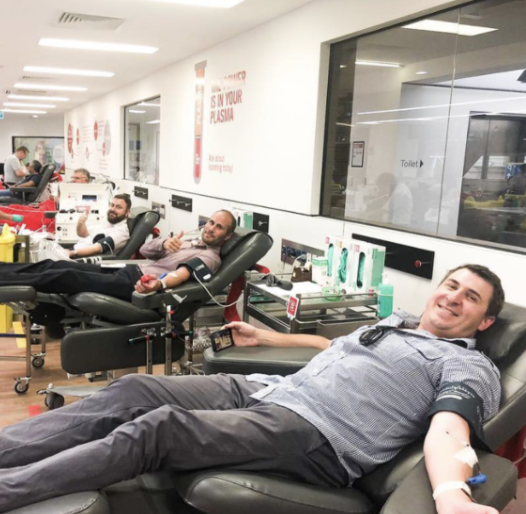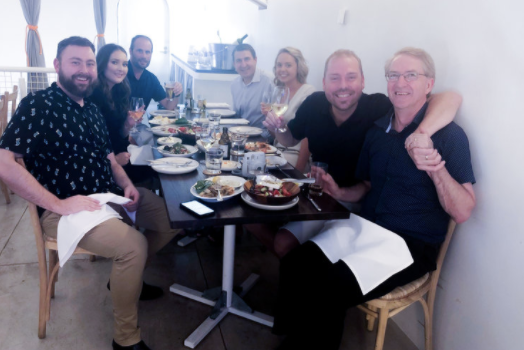"It is a given that profit is the goal of any business, but to suggest that it is the primary responsibility of a business is misguided. It is the leaders of companies that see profit as fuel for their culture that will outlast their dopamine addicted, cortisol-soaked competitors.
The responsibility of a company is to serve the customer. The responsibility of leadership is to serve their people so that their people may better serve the customer. If leaders fail to serve their people first, both customer and company will suffer."
- Simon Sinek, Leaders Eat Last
When people ask me about the success of Sharp & Carter and how we have grown to 125 people across 3 states, there are a number of things that come to mind that I believe we have done well in the way we lead and structure our business. However, by far the most important factor is our culture, which acts as the engine of our business. It is our competitive advantage in the marketplace and the key reason for our success.
When I describe our culture to our team, or to someone external I describe the four pillars our culture rests on:
FOUR PILLARS OF OUR CULTURE:
Trust
Humility
Generosity
Care
Today I want to write about Care and why caring for our people is so critical to the success of our culture. Intuitively it makes sense - if you ask people to think about mentors, coaches or teachers that have gotten the best out of them, and to think about the adjectives they would use to describe them they will say things like they were “inspiring”, “empowering”, “collaborative”, “trusting” “caring” ….
So why do so many business leaders micro-manage, “pressure”, “tell”, “threaten” and “direct”?
We have a belief - one which our experience and track record supports - that caring for people puts people in a situation where they can be at their best over a long period of time. But what does that look like? It’s not a 9-5 thing, it is an always thing. We have found that to truly care for people, it is not enough to just care for people as professionals during work hours, or to care for them by being a good leader.
In order to truly care for people, we have to extend our care beyond the workplace. This doesn’t mean we will tell people how to live their lives, but we do believe there are certain universal things for all of us that are critical to living a fulfilling life:
If you have some friends, it is better than not having any friends
If you have some hobbies that you enjoy and give you an outlet it is better than having no hobbies
If you are mentally and physically healthy it is better than being mentally and physically unhealthy
If you have a functioning relationship with your family it is better than having a toxic relationship with your family
If you have love in your life it is better than not having any love in your life
|  | |  | |  |
We have found that if people don’t have these things in life they generally aren’t as happy and sometimes cannot enjoy their everyday as much. We are interested in and take an active role in encouraging our people to grow as people and implementing some of these changes can help people reach significant goals in their personal and professional lives. If people are leading a fulfilling life, they are likely to stay in their jobs and our business becomes a lot more sustainable and profitable. To this end we recently agreed as a team that the leaders of Sharp & Carter:
“Exist to serve and care for our people to ensure individual fulfilment.”
An example of this is a colleague of mine who suffers from an ongoing, severe medical condition. Prior to joining Sharp & Carter he spent 4 years at another recruitment firm and describes an environment where you could not let your personal life - in this case, his medical condition, impact your work.
The pressure to perform was constant and never ending. He was never allowed to “take his foot off the gas” and this meant he was constantly rushed and stressed, and so he compromised on rest and exercise. He describes feeling anxious about taking time off to attend medical appointments, and that during his 4-year employment at that company he had twelve flare ups of his condition.
During this person’s interview process with S&C, and during his early days we made it very clear that his health and his personal life was the most important thing. Through his almost 4-year tenure at Sharp & Carter he describes how he still has moments where he works hard, but he is also able to utilise quieter times to rest and relax. He has never felt pressured here, and he has never compromised on exercise and his health. As a consequence of that, he has had only two flare ups (as opposed to 12 in the previous four-year period) since he commenced at our company.
In addition to this, he has achieved a 20% improvement on billing performance – a sign that not only is he healthy, but he is also achieving incredible professional success, all while looking after himself!
|  | |  | |  |
This approach of caring for our people does rely upon knowing our people. And in order to grow a relationship with someone you need to invest in that relationship with time, interest, and creating an environment where people know that they come first – before profit and before shareholders.
Here are some quotes that I have read across the journey which ring true for us:
“To truly care for someone means that their interests come before your own.”
“Leadership is being a gardener. Gardeners don’t grow anything, plants do. Gardeners create environments and care for the plants to flourish.”
“People need to be able to try and fail and fall and get back up again and they won’t be able to do it without leaders who say, ‘I believe in you, I will teach you, try again’.”
“Leadership is a huge sacrifice and a huge responsibility. You get the joy of seeing someone in your care become more than they thought they were capable of becoming.”
“We want people to work with us out of love not fear.”
“Customers will never love a company until the employees love it first.”
“People are not things to be used, they are people to be loved.”
Do you genuinely feel cared for at work? Do you feel like you come first? If not, you are probably not alone and it could be time to contribute to a change in approach at your organisation by treating the people you work with differently.







